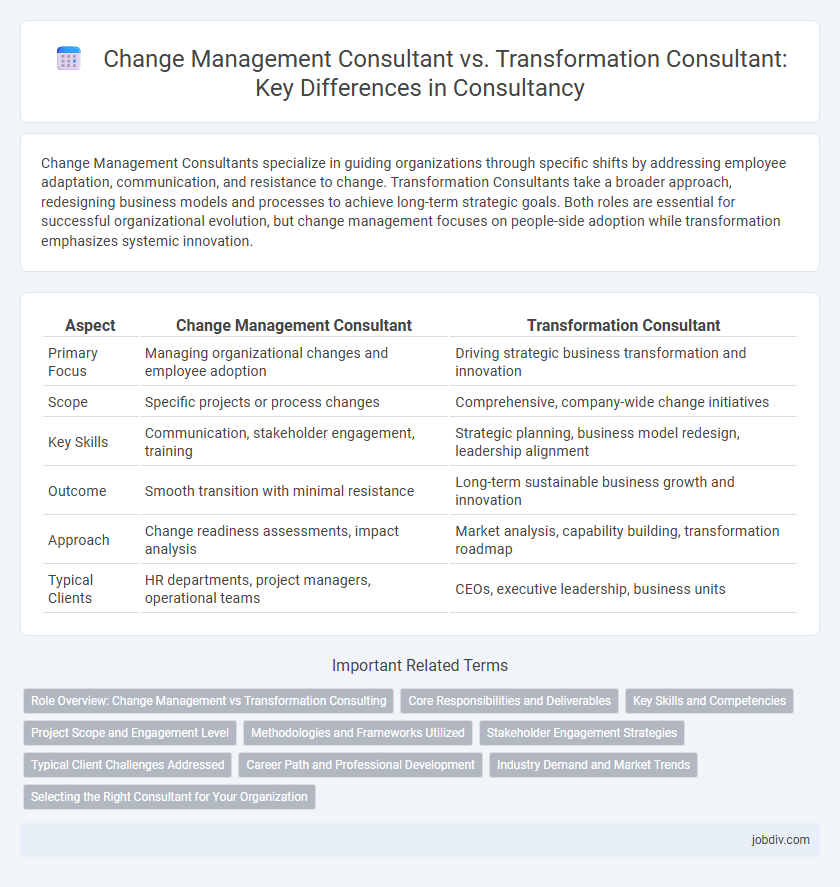Change Management Consultants specialize in guiding organizations through specific shifts by addressing employee adaptation, communication, and resistance to change. Transformation Consultants take a broader approach, redesigning business models and processes to achieve long-term strategic goals. Both roles are essential for successful organizational evolution, but change management focuses on people-side adoption while transformation emphasizes systemic innovation.
Table of Comparison
| Aspect | Change Management Consultant | Transformation Consultant |
|---|---|---|
| Primary Focus | Managing organizational changes and employee adoption | Driving strategic business transformation and innovation |
| Scope | Specific projects or process changes | Comprehensive, company-wide change initiatives |
| Key Skills | Communication, stakeholder engagement, training | Strategic planning, business model redesign, leadership alignment |
| Outcome | Smooth transition with minimal resistance | Long-term sustainable business growth and innovation |
| Approach | Change readiness assessments, impact analysis | Market analysis, capability building, transformation roadmap |
| Typical Clients | HR departments, project managers, operational teams | CEOs, executive leadership, business units |
Role Overview: Change Management vs Transformation Consulting
Change Management Consultants specialize in guiding organizations through specific transitions by focusing on employee adoption, communication strategies, and minimizing resistance to change. Transformation Consultants address broader strategic shifts, encompassing cultural, operational, and technological changes to drive long-term value and competitive advantage. While Change Management targets individual project success, Transformation Consulting aims at holistic organizational evolution and sustainable growth.
Core Responsibilities and Deliverables
Change Management Consultants focus on guiding organizations through specific transitions by managing stakeholder engagement, communication plans, and employee adoption strategies to ensure successful implementation of change initiatives. Transformation Consultants drive broad organizational shifts by aligning business strategy, technology integration, and process redesign to achieve long-term growth and operational excellence. Deliverables for Change Management include change impact assessments, training programs, and resistance management plans, while Transformation Consultants provide roadmap frameworks, digital transformation strategies, and enterprise-wide capability assessments.
Key Skills and Competencies
Change Management Consultants excel in stakeholder engagement, risk assessment, and communication strategies to ensure smooth transitions during organizational changes. Transformation Consultants combine expertise in strategic planning, technology integration, and business process re-engineering to drive large-scale, sustainable improvements. Both roles require strong leadership, analytical thinking, and adaptability, but Transformation Consultants focus more on innovation and long-term growth, while Change Management Consultants emphasize managing employee resistance and operational continuity.
Project Scope and Engagement Level
Change Management Consultants typically focus on guiding organizations through specific transitions by managing employee adoption and minimizing resistance within defined project scopes. Transformation Consultants engage at a broader organizational level, driving comprehensive strategic shifts that often reshape business models, culture, and operations across multiple functions. The engagement level of Transformation Consultants is usually deeper and more extensive, involving continuous collaboration and long-term change initiatives beyond isolated projects.
Methodologies and Frameworks Utilized
Change Management Consultants primarily utilize methodologies such as ADKAR, Kotter's 8-Step Model, and Prosci's Change Management Framework to guide organizations through incremental shifts, focusing on individual adoption and minimizing resistance. Transformation Consultants employ broader frameworks including McKinsey's 7S, Agile Transformation, and Business Model Canvas to drive strategic, organization-wide change, integrating culture, processes, and technology. Both roles leverage stakeholder analysis and communication plans but differ in scope, with Change Management targeting people-focused adjustments and Transformation emphasizing holistic, systemic evolution.
Stakeholder Engagement Strategies
Change Management Consultants specialize in stakeholder engagement by developing communication plans that address resistance and foster employee buy-in throughout incremental change initiatives. Transformation Consultants implement broader stakeholder engagement strategies aimed at aligning cross-functional teams and executive leadership with long-term organizational vision and systemic business process redesigns. Both roles prioritize stakeholder analysis and feedback loops, but Transformation Consultants often utilize change networks and digital collaboration tools to drive holistic transformation.
Typical Client Challenges Addressed
Change Management Consultants primarily address client challenges related to employee resistance, communication breakdowns, and adapting organizational processes during transitions. Transformation Consultants tackle broader issues including strategic realignment, cultural shifts, and integrating technological innovations to drive long-term business evolution. Both roles focus on minimizing disruption, but Transformation Consultants emphasize holistic change impacting entire business models.
Career Path and Professional Development
Change Management Consultants typically specialize in guiding organizations through specific transitions by focusing on stakeholder engagement, communication strategies, and resistance management, building deep expertise in behavioral change and project management. Transformation Consultants adopt a broader scope, integrating strategic business realignment, technology adoption, and cultural shifts, which requires developing skills in digital innovation, leadership influence, and cross-functional collaboration. Career progression for Change Management Consultants often leads to roles in organizational development or HR leadership, while Transformation Consultants advance toward executive advisory or chief transformation officer positions, emphasizing strategic vision and enterprise-wide impact.
Industry Demand and Market Trends
Change Management Consultants are increasingly sought after in industries facing incremental shifts, emphasizing employee adoption and process optimization to ensure seamless transitions. Transformation Consultants command higher demand in sectors undergoing radical digital disruption or business model overhauls, leveraging comprehensive strategies that integrate technology, culture, and organizational redesign. Market trends indicate a growing preference for Transformation Consultants in technology-driven markets, while Change Management Consultants remain critical in traditional industries prioritizing operational stability.
Selecting the Right Consultant for Your Organization
Selecting the right consultant for your organization depends on your strategic goals: Change Management Consultants specialize in guiding employees through specific processes, emphasizing communication and adoption strategies, while Transformation Consultants focus on comprehensive, organization-wide shifts involving culture, operations, and business models. Understanding whether your priority is managing transition smoothly or driving fundamental business evolution will determine the best fit for your organization's success. Evaluate consultants' expertise in industry-specific methodologies and past impact metrics to ensure alignment with your transformation objectives.
Change Management Consultant vs Transformation Consultant Infographic

 jobdiv.com
jobdiv.com